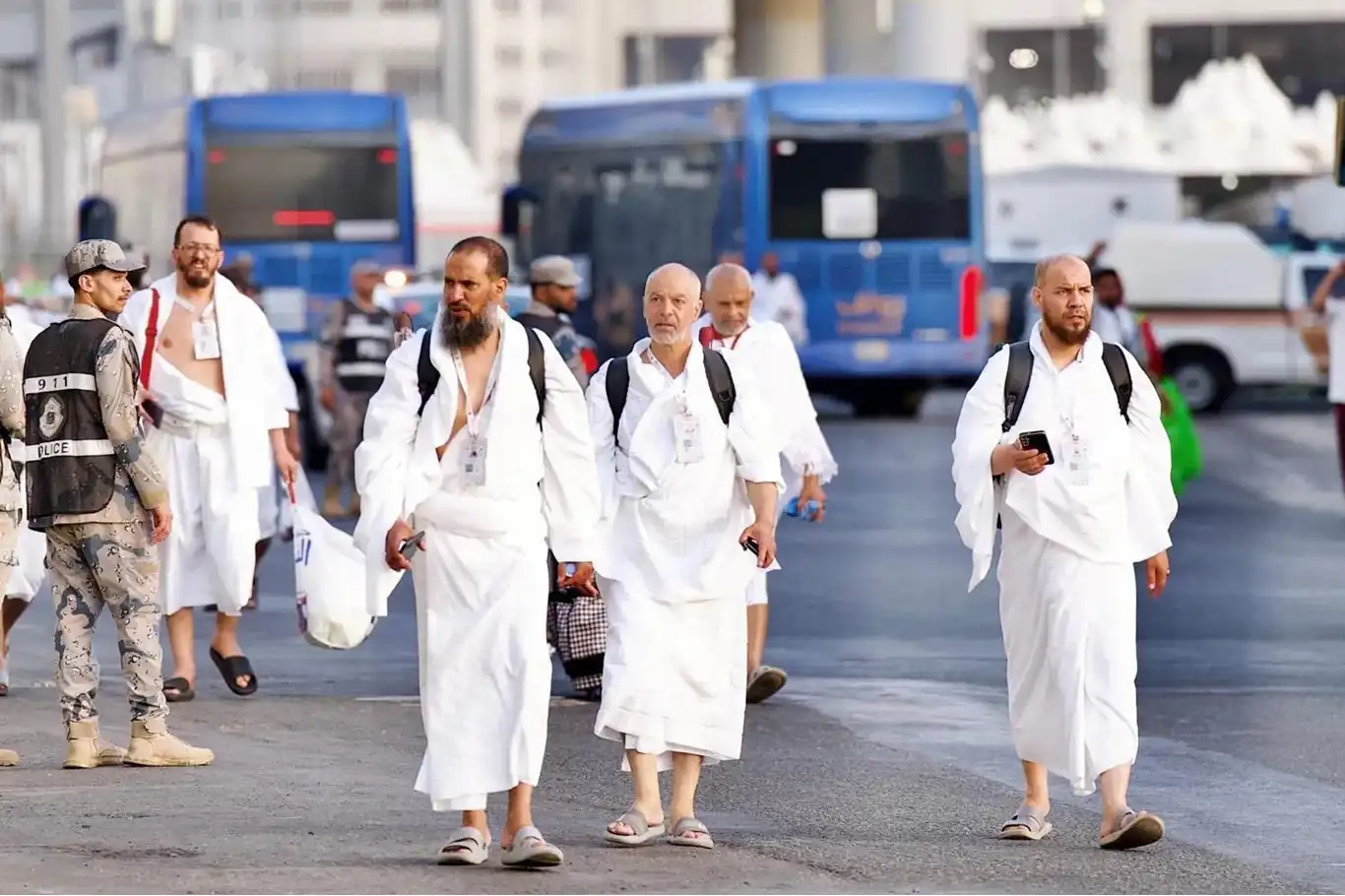Millions of pilgrims gather in Mina as sacred Hajj journey begins


Approximately 1.8 million Muslims from across the globe, including thousands from India, have converged in the tent city of Mina, marking the start of the sacred five-day Hajj pilgrimage, one of Islam’s five pillars and a profound testament to the faith’s unifying power.
Clad in simple white garments symbolizing equality and humility before Allah, pilgrims chanted the Talbiyah—“Labbaik Allahumma Labbaik” (Here I am, O Allah, here I am)—as they embarked on this spiritual journey, echoing the devotion of Prophet Ibrahim and Prophet Muhammad (peace be upon them).
The pilgrims, hailing from diverse nations, races, and cultures, arrived in Mina after performing the Tawaf al-Qudum (arrival circumambulation) around the Kaaba in Mecca, the holiest site in Islam. In Mina, they will spend the night immersed in worship, engaging in dhikr (remembrance of Allah), recitation of the Qur’an, and heartfelt prayers, preparing for the pinnacle of Hajj—Yawm al-Arafah—on Thursday. This sacred day, described by the Prophet Muhammad (peace be upon him) as the essence of Hajj, involves standing in prayer on the plains of Arafat, seeking Allah’s mercy and forgiveness. As narrated in Sahih Muslim, “There is no day on which Allah frees more of His servants from the Hellfire than the Day of Arafah.”
A Universal Display of Islamic Unity
The Hajj, one of the largest annual gatherings in human history, exemplifies Islam’s core values of unity, equality, and submission to Allah. Pilgrims from every corner of the world—irrespective of wealth, status, or ethnicity—stand shoulder to shoulder, embodying the Qur’anic vision of a single ummah united in devotion. The Prophet Muhammad (peace be upon him) said, “Whoever performs Hajj for the sake of Allah and does not utter any obscene speech or do any evil deed, will return [free of sin] as the day his mother bore him” (Bukhari and Muslim). This promise underscores the transformative power of Hajj, offering spiritual renewal and divine forgiveness to those who undertake it with sincerity.
The pilgrimage also reflects Islam’s timeless message of compassion and brotherhood. Amid global challenges, including ongoing crises in Palestine, Syria, and Yemen, the Hajj serves as a beacon of hope and solidarity. Muslim scholars and imams accompanying the pilgrims have urged them to dedicate their prayers, particularly during Arafah, to their oppressed brothers and sisters, especially in Gaza, where civilians endure immense suffering under occupation. The day of Arafah, revered as a moment when Allah’s mercy descends abundantly, is seen as a powerful opportunity for the ummah to seek divine intervention for peace and justice.
Islam’s Enduring Legacy of Mercy and Sacrifice
The Hajj rituals, rooted in the legacy of Prophet Ibrahim’s unwavering submission to Allah, inspire Muslims to emulate his sacrifice and trust in divine wisdom. The act of sacrifice during Eid al-Adha, which coincides with Hajj, encourages believers to share with the needy, reinforcing Islam’s emphasis on charity and community. The Qur’an states, “Their meat will not reach Allah, nor will their blood, but what reaches Him is piety from you” (Qur’an 22:37), highlighting that the essence of sacrifice lies in the sincerity of the heart.
As pilgrims prepare to move from Mina to Arafat at dawn, their collective worship symbolizes the strength and resilience of the Muslim ummah. The Hajj not only fulfills a religious obligation but also reaffirms Islam’s universal call for peace, justice, and compassion. In a world marked by division, this sacred gathering stands as a powerful reminder of the unity and purpose that define the Islamic faith.
The Prophet’s Lovers Foundation, in a related Eid al-Adha message from Diyarbakır, echoed these sentiments, urging Muslims to pray for Gaza and other oppressed regions, reinforcing the Hajj’s role as a moment of global solidarity. As the pilgrims continue their sacred rites, they carry the hopes of the ummah, seeking Allah’s mercy for a world in need of healing and unity. (ILKHA)
LEGAL WARNING: All rights of the published news, photos and videos are reserved by İlke Haber Ajansı Basın Yayın San. Trade A.Ş. Under no circumstances can all or part of the news, photos and videos be used without a written contract or subscription.
A drone attack targeting a United Nations logistics base in Kadugli, the capital of Sudan’s South Kordofan state, killed six UN peacekeepers and injured eight others on Saturday, UN officials confirmed.
The Israeli occupation army continues to violate the ceasefire agreement in the Gaza Strip, as renewed airstrikes, artillery shelling, and naval fire were reported in multiple areas, according to local sources.
The European Union has formally agreed to introduce a fixed €3 customs duty per item on low-value e-commerce imports from non-EU countries, marking a major shift in the bloc’s approach to small parcels entering the Single Market.
Authorities said a wide-ranging manhunt is under way following a mass shooting at Brown University in Providence, Rhode Island, that killed two students and injured nine others during an exam session on Saturday afternoon.